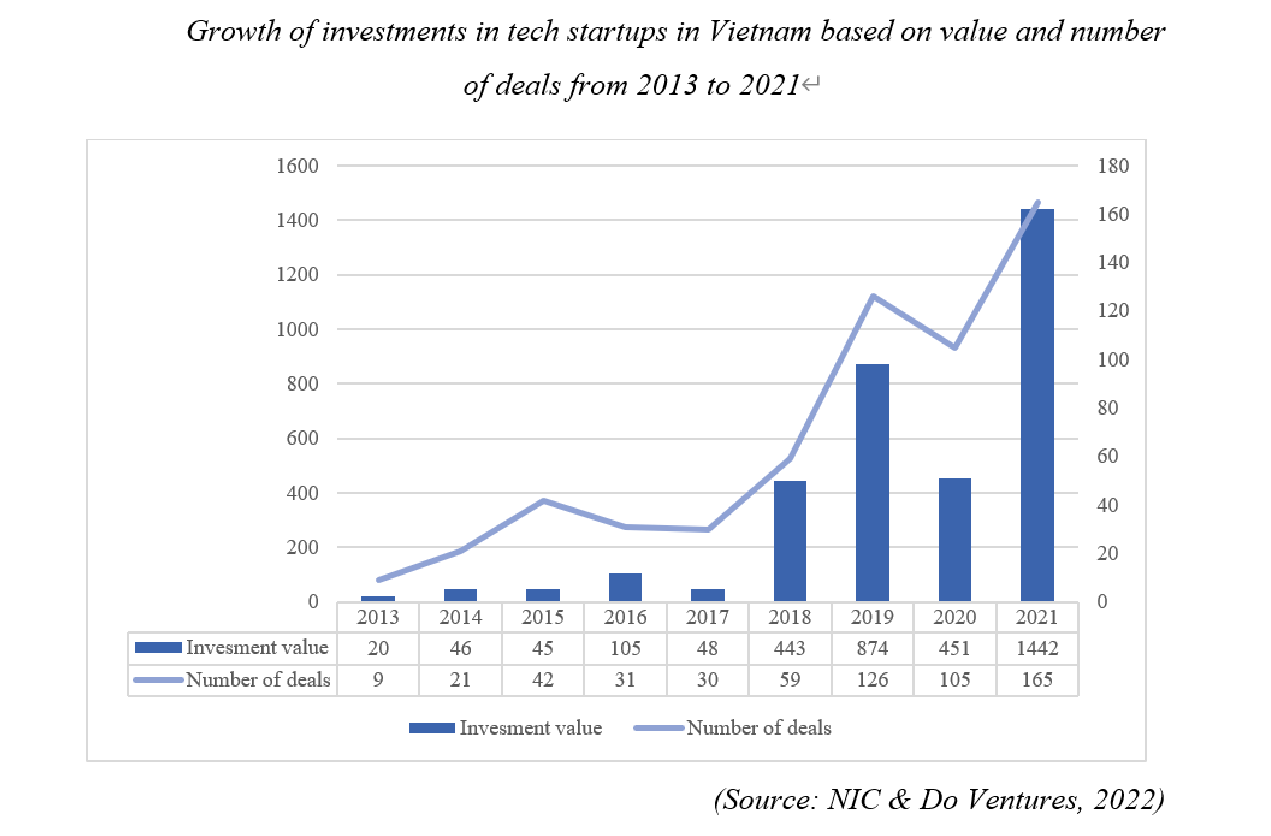
The latest startup trends in Vietnam
Overview of startups in Vietnam
Over 97.3 million people live in Vietnam, and 98% use smartphones. Of these, 70% are internet users. Internet usage is much more common than a decade ago, surpassing prior benchmarks. Vietnam is now recognized as having a substantial technology market as a result. Despite this, the idea of startups is still relatively new. About 15 years ago, several businesses were founded in e-commerce and online education, kicking off the growth of startups in Vietnam. However, Vietnam didn’t have complete access to all the components of a robust tech startup ecosystem until 2016.
In 2016, the implementation of Project 844 was initiated with the objective of fostering an innovative startup ecosystem. This project involved various activities aimed at creating a conducive environment for the growth of rapidly expanding businesses that rely on intellectual property, new technologies, and innovative business models. The enactment of the 2017 Law on Supporting Small and Medium Enterprises provided a clear definition of innovative small and medium enterprises, serving as a foundation for subsequent support measures outlined in decrees. Subsequently, in 2018, investment guidelines for startups were issued, effective until 2020, which introduced additional categories of investment incentives.
Over the course of approximately four decades since the doi moi policy, which marked Vietnam’s economic renovation, the country has seen the establishment of around 600,000 enterprises, out of which approximately 3,800 can be classified as startups (MOST, 2018). Vietnamese startups have achieved noteworthy successes throughout three distinct stages of development (Chinh et al., 2020). The initial phase encompassed companies established prior to the 2000s, including Vinagames and VC Corporation. The second phase, spanning from the 2000s to 2014, witnessed the rise of prominent businesses such as Tiki.vn and Momo e-wallet, coinciding with the advent of the Internet boom. The third phase, commencing in 2015, featured remarkable achievements, with the emergence of the unicorn company SkyMavis.
The number of successful capital-raising transactions by venture capital funds in Vietnam has increased. Notably, the investment wave in startup enterprises has experienced significant growth since 2015, doubling the number of successful capital-raising ventures compared to the preceding year. In 2017 and early 2018, funding activities for startups were notably active, resulting in 92 startups receiving investments totaling up to $291 million (Topica, 2018). The total value of investment deals in 2018 reached $443 million, encompassing 59 deals, in contrast to $48 million and 30 deals in 2017. Following the upward trajectory in 2018, 2019 witnessed the most substantial surge in startup investments, with 126 investment deals amounting to a total transaction value of $874 million. In 2020, due to the adverse effects of the Covid-19 pandemic and the looming risk of a global economic downturn, investment in Vietnam’s startup enterprises experienced a significant decline. Total investment declined by 48% compared to 2019, and transactions decreased by 17%. However, in 2021, as the economy rebounded from the impact of the pandemic, the amount of investment capital in the Vietnamese market tripled, accompanied by a surge of over 50% in the number of deals.

University as a key stakeholders in Vietnam startups ecosystem
Startups ecosystem is the term used to describe the large and diverse array of participants and resources that contribute to and are necessary for ongoing innovation in a modern economy. This included entrepreneurs, investors, researchers, university faculty, venture capitalists, business development, and other technical services providers such as accountants, designers, contract manufacturers, and providers of skills training and professional development (IPP, 2018).
Universities play a crucial role throughout the concept creation, product development, and growth phases of the startup process. Professors and support groups are great sources of information, examples, and lessons learned during the early stages. In Vietnam, universities and research institutions work with provincial governments and central ministries to create support units inside of universities and to plan startup events that encourage the development of an entrepreneurial culture among young people. These occasions include the Vietnam Student Association’s Startup Student Ideas Contest, the Foreign Trade University’s “Starting a Business with Kawai” initiative, the National Economics University’s “I-startup” program, and the Vietnam National University of Agriculture’s “Agricultural Startup Contest,” among others. These programs are mainly intended to promote youth entrepreneurship and support a thriving startup ecosystem in the nation. To facilitate the development and commercialization of students’ ideas, various entrepreneurship competitions are made available to them. These competitions serve as platforms where students can showcase their entrepreneurial endeavors and gain support for transforming their concepts into viable businesses. It is commonly encouraged for students, starting from their second year, to embark on their entrepreneurial journeys, with a preference for establishing startup ventures.
Overview some top startup trends in Vietnam
In recent times, Vietnam has witnessed a notable upswing in entrepreneurial activities, indicative of the country’s burgeoning startup ecosystem. Within this context, several prominent trends have emerged across various industry sectors. Firstly, there has been a remarkable growth of E-commerce and Fintech startups, bolstered by the rapid adoption of digital technologies and evolving consumer preferences. Secondly, the Agritech sector has experienced significant advancements as startups harness technology to optimize agricultural practices and promote sustainable farming methods. Thirdly, healthtech startups have emerged to address pressing healthcare challenges, offering innovative solutions such as telemedicine, healthcare management systems, and wellness platforms. Moreover, edtech startups have disrupted the education landscape, revolutionizing learning through online platforms and personalized educational experiences. Lastly, the logistics and delivery domain has witnessed the rise of startups catering to the increasing demand for efficient last-mile delivery services. These trends collectively exemplify the dynamic and diverse nature of Vietnam’s startup ecosystem.
Biomass Lab
The Biomass Lab group, nominated by the Foreign Trade University, has showcased remarkable achievements in biofuels and biomass research. Through their innovative approach, the group advanced through two competitive rounds and secured three prestigious awards in the finals. The focal point of their work lies in developing cost-effective technology for producing bacterial cellulose (BC) films. This involves the hydrolysis and fermentation of waste sludge derived from paper mills. The conversion of paper sludge into BC has exhibited promising efficiency, indicating the potential for substantial economic gains. BC possesses many applications, including its direct utilization as a raw material to enhance the quality of paper produced in mills.
Moreover, the Biomass Lab team conducted experiments involving the hydrolysis of BC to obtain nano-sized rod-shaped cellulose (CNC) crystals. Remarkably, CNC biomaterials demonstrate impressive characteristics, as they are eight times stronger than steel and are as light as wood. This breakthrough holds immense potential for developing future metamaterials with distinctive properties and functionalities. Notably, the achievements of the Biomass Lab group have set a significant milestone as the first representative from Startup Vietnam to reach the top six enterprises in the final round of the competition, ultimately securing the third-place prize. Their groundbreaking work exemplifies the innovative and entrepreneurial spirit within Vietnam’s startup ecosystem, contributing to the advancement of sustainable and cutting-edge technologies in biomass research and utilization.
In biotech, Vietnam is experiencing a notable trend toward innovation and entrepreneurship. Startups in the country are increasingly focusing on developing cutting-edge biotechnologies and solutions across various sectors. This includes advancements in healthcare, agriculture, environmental sustainability, and food production. These startups leverage technologies like genetic engineering, biopharmaceuticals, precision medicine, and bioinformatics to address critical challenges and deliver impactful solutions. The growing interest and investment in biotech startups highlight Vietnam’s commitment to fostering a vibrant ecosystem that promotes scientific research, technological advancements, and sustainable development in the biotechnology industry.

Abivin
Abivin specializes in providing intelligent software solutions tailored to enterprises’ needs. The company’s distinctive competence lies in its expertise in big data analytics, artificial intelligence (AI), the Internet of Things (IoT), smart algorithms, and optimization techniques. Abivin’s flagship offering, Abivin vRoute, represents an advanced AI-powered Logistics Optimization Solution incorporating a proprietary route optimization algorithm. This powerful solution has garnered recognition from esteemed clients such as P&G, FrieslandCampina, A.O.Smith, Habeco, and KOSPA Logistics, who have benefited significantly from cost savings of up to 30%, increased productivity, digitize end-to-end delivery processes, and improved management efficiency.
As a frontier technology startup in Vietnam, Abivin has demonstrated notable success and has received financial support through the Innovation Partnership Program, a joint initiative by the governments of Vietnam and Finland. The company’s expansion is progressing rapidly within the ASEAN region, with current operations in Vietnam, Singapore, Myanmar, and Indonesia. The founding team of Abivin is composed of exceptional individuals with a robust technical background, further contributing to the company’s strong foundation and potential for continued growth.
Abivin’s focus on frontier technologies and its proven track record and government support position it as a prominent player in the field. The company’s expansion within the ASEAN market reflects its commitment to addressing the evolving needs of enterprises in the logistics sector. At the same time, its founding team’s expertise and technical proficiency reinforce its competitive advantage and potential for sustained success.
The trend of innovative startups in Vietnam is gaining momentum, driven by advancements in frontier technologies such as AI, big data analytics, and IoT. Startups like Abivin are at the forefront, providing intelligent software solutions that optimize logistics processes, resulting in significant cost savings, increased productivity, and improved management efficiency. These ventures demonstrate Vietnam’s potential as a thriving hub for technology-driven startups in Southeast Asia.
Author:Nguyen Thi Hanh PhD, Lecturer, Foreign Trade University
 Dr. Nguyen Thi Hanh is a lecturer of Faculty of Business Administration, Foreign Trade University, Vietnam. She was one of the thirty six lecturers in Vietnam who certified in Training of Trainers 2 (ToT2) by IPP2 Project. She research is situated in the field of Innovation & Entrepreneurship, with a special focus on Startup financing, Capital structure of Startups and Innovation in some industries such as fintech, agritech and biotechnology.
Dr. Nguyen Thi Hanh is a lecturer of Faculty of Business Administration, Foreign Trade University, Vietnam. She was one of the thirty six lecturers in Vietnam who certified in Training of Trainers 2 (ToT2) by IPP2 Project. She research is situated in the field of Innovation & Entrepreneurship, with a special focus on Startup financing, Capital structure of Startups and Innovation in some industries such as fintech, agritech and biotechnology.